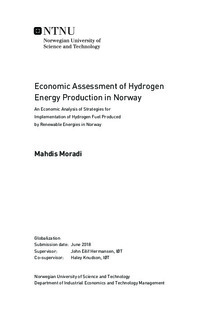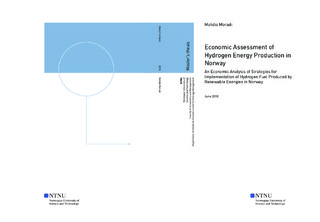| dc.description.abstract | Hydrogen energy is expected to become an important part of the energy system in Norway and play a significant role in transition to green fuels in the near future. The global attempt to protect the environment against economic growth, global warming and recent oil crisis, which increased the demand for more secure energy, is a great incentive to shift to clean energies. Currently, hydrogen market is not competitive and its production is only for satisfying internal demands of specific industries. It is necessary to take into account the challenges of hydrogen energy integration into the current energy system.
This study investigates strengths, weaknesses, opportunities and threats of hydrogen energy market in Norway. It addresses a research gap by determining and prioritizing the important factors influencing the success of hydrogen energy in the energy market. Furthermore, a cost analysis is conducted to compare the costs of different methods of hydrogen energy production. This cost analysis is useful to choose a more cost effective method to produce hydrogen energy. The results of this thesis could be useful for decision makers and stakeholders to implement efficient strategies. The results show that availability of different primary resources to produce hydrogen energy and strong research and development organizations help Norway create competitive advantage from hydrogen energy and its related technologies. However, to make hydrogen energy competitive it is important to develop the required infrastructure, increase the support from the government and make alliance with local politicians or business owners. Prioritization of the important factors of the success of hydrogen energy shows that feasibility, production costs and reliability, are the most important factors. Cost analysis demonstrates that the most cost effective way to produce clean hydrogen energy is to produce it on-site by electrolysis. | |

